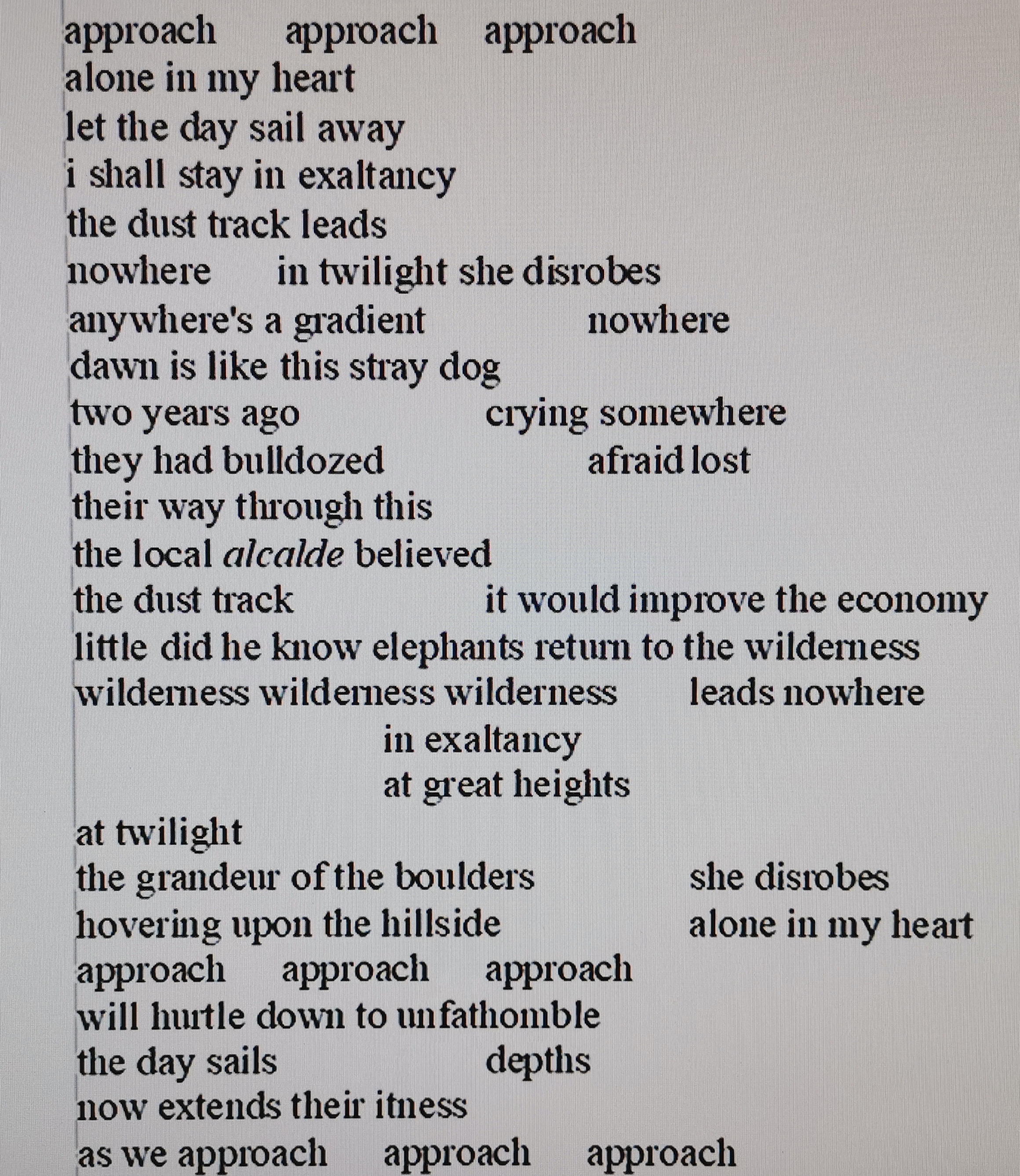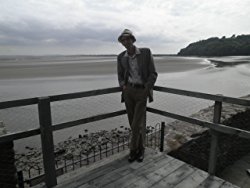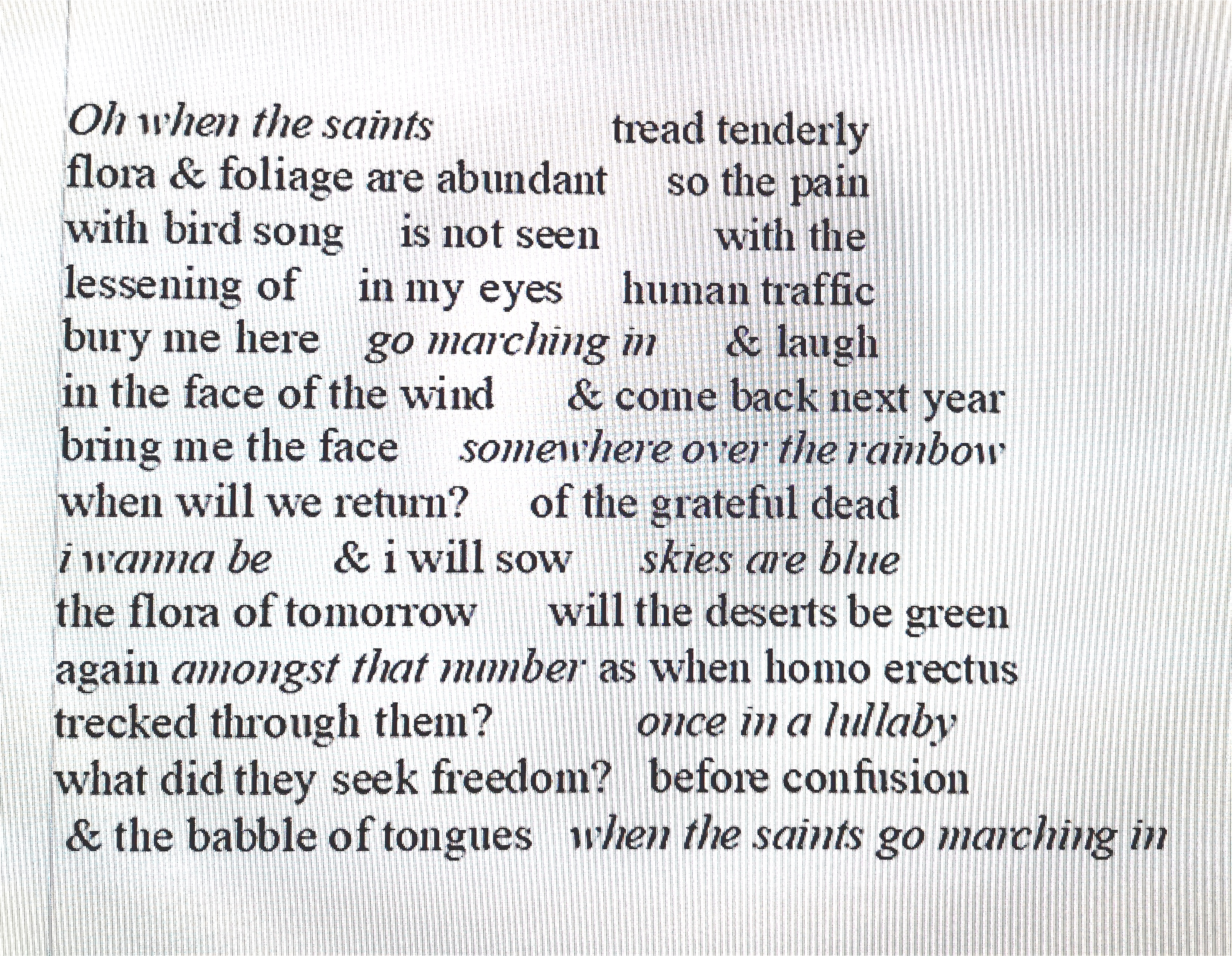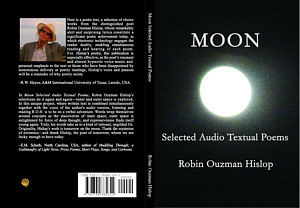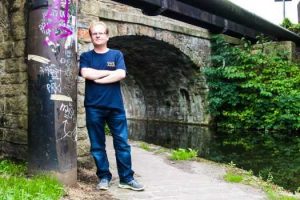Editor’s note: this poem is a lengthy text, the translation is given first & then the original follows & finally the relevant bio info.
ALMOST A NOCTURNE
Guilt is an argument
to feel alive, fear
another;
any defense
improvised from a threat,
is another;
being told you’re smarter
than someone else
is another;
the best argument is perhaps
to remember
how we had prepared everything
to write without guilt
instead of loafing about
not to sleep a wink
and feel life slip by.
To worry about distant friends
who do not call, not knowing
if they’ re still alive
yet another.
But the maximum argument
to feel alive is to feel
that you’re wasting your time.
Any incentive,
drug or dressing that heals
the “malheur de vivre”
is, in short, a force driving the
guilt of being alive
but insufficiently.
To think that nobody cares,
that there is no friend
aware of you
makes us prone
to experience guilt
which in turn lets us
experience being alive.
I refuse to speak in the first person
because I don’t know
if I’m an individual
alive
outside language.
It’s the time when wolves
go out to howl at inhospitable
nature;
I barely feel my toes
scratch the edge of the bed
rub each other
like sticks on distant drums;
their percussion reverberates
through my body with waxed ears
of a mummy
but more alive,
than Clarice’s clock
pounding at dawn.
Nothing makes sense,
Would it, if I’d lived with you,
X, H or J of my past, present, or future?
And here, I survive
without a dog or cat
or a clock.
But even so
even so if
I waste time on this
my mental calculator
catches on
and condemns me
with such lucid argument
to experience
the guilt that makes me feel alive
in a bad way.
In this uncertain
existence, to the friend who feeds us
to reinforce their vitality
while feeding ours,
I reply with warmth
but no tea,
because it keeps you awake
and makes you think
which prevents
living
as something natural.
Living is natural
like this light coolness
on my back
and this slight discomfort
of a quilt too warm
making you successively
put off and on
words of life
with their doubts, meanderings:
live, living, surviving.
Little by little
an appetite is born;
I continue living
as I begin to wake up
turning in bed
-left right-
wanting day to come
promising “ficar bonito”.
I begin to understand
St John Perse’s list of posts,
it must have been
at dawn,
scattered like a man’s crumbs
through his long lined verses
whose sum: one over one
make the poem.
And I’m already awake,
while tire wheels roll
out of my cotton filled ears
like waves on the sidewalk,
behind a closed glass
behind my life
with a drawn curtain
already standing
already rhetorical.
Haven’t you ever thought of having children
friend ?
you wouldn’t be able to sleep at night
for their screams,
but a part of you can do it
because of it…,
although another’s life
isn’t an argument
to lose sleep over
or recover it,
there are borders between us,
jagged boundaries as between
stamps.
I turn off
and on
the coolness on my back persists
as if after so much searching
my back was the dark side of the moon
my feet explore
at the bottom of galaxies
through black holes
tunnelling under the quilt
at the edge of the bed.
Between turning on and off
there is a photogenesis of night
that appears
at will.
Click, clack
René Daumal
click, clack
Lota Macedo
click, clack
Oscar Manesi
click, clack
A. Pizarnik
click, clack
me you him
blasphemy
error.
An association is like placing a carriage on a track
to set in motion,
thus night rolls
with a click
like Clarice’s clock;
the clock is a camera filming
passing time.
What a big animal
in the dark!
I don’t know my limits,
I turn on the light
for the shameful life
of that autonomous hand
filming outside myself
on paper, with pencil,
the pretensions of the poet writing
as a movie shot
in which I’m absent;
only the coolness
and the instep of my right foot
as it molds my left leg’s calf
gives me back my limits.
How disgusting life is
when you want to go to the toilet
but it’s just a plane traversing
your hollow belly over the Gulf of Mexico
before the storm
is unleashed,
taking into account
that being alive
is a way of being
harassed
by terrestrial functions.
Body drifting,
but there is too much light
to say so
night fails
and is rhetorical.
Rhetorical, the warp and woof
of a gem illuminated tapestry
from another age.
Darkness
orders and disorders the world
at the same time
and now everything
feels like my back;
I want to be hungry
or pee to stand up again
not this coolness without limits.
She/he lied to me
and now they pay the price
by losing the meaning
of their lie.
The only reason
for being alive
is to whisper these things
in my ear.
Night is a field
of phosphenes and barbed wire
that starts in
the frontal lobe;
as long as my mouth
pours this fluidity
from above
I will believe in a soul,
click, clack.
In Madrid
I switch on
the light
in my Paris room
knowing
through this motion
I exist
click, clack,
at dawn.
I want to roll myself up in the quilt
in an interspatial rocket
riding the coolness of galaxies,
not this earthly
red light
but the dust of stars
precipitated suddenly blue.
How relative
language is…
Little by little I recover
to form a notion of reality,
to breath for my frontal lobe
so it becomes night once more.
My only privacy
is with myself,
at times I’m so far
I don’t recognize myself,
but they talk to me, watch me
and there I am,
at times I’m so close
I can spare knowing me.
In the morning I will recover
my identity
like one who puts her toes
inside the quilt’s capsule
so that they form a whole,
so that they complete a whole.
To the traitor/ess
I do not know you
as a person,
you’re not on my path
or maybe yes, as one more mask.
This I know now.
I don’t know if I’ll know later
when the various layers
of myself overlap
and I fly over the cosmos
in the space capsule
of my quilt.
I’m not me
but my balance is so delicate
that I can try to be me,
and some do try again
(psycho)
for the pleasure of recognizing themselves.
Noni Benegas
Translated by Robin Ouzman & Amparo Arrospide
CASI UN NOCTURNO
La culpa es un argumento
para sentirse vivo, el miedo
otro;
la defensa, cualquier defensa
improvisada ante una amenaza,
otro;
ser más inteligente que alguien
(y que lo digan)
otro;
recordar cómo habíamos preparado todo
para escribir sin culpa
en vez de haraganear,
el mejor, quizás,
a fin de no pegar ojo
y sentir la vida pasar.
Preocuparse por los amigos lejanos
que no llaman y se ignora si aún viven
otro,
pero el argumento máximo
para sentirse vivo es sentir
que se está perdiendo el tiempo.
Cualquier aliciente,
droga o apósito que cure
del “malheur de vivre”
es, en definitiva, un
propulsor de la culpa
del hecho de estar vivo
sin estarlo lo suficiente.
Pensar que a nadie le importa
y no hay ninguna amistad
que se interese,
nos hace proclives
a experimentar la culpa
que a su vez permite
experimentar la sensación
de estar vivos,
y me niego a hablar en singular
porque no se si yo,
fuera del lenguaje,
estoy viva
en particular.
Es la hora en que los lobos
salen a aullar a la naturaleza
inhóspita;
apenas percibo los dedos de mis pies
que arañan el borde de la cama
y se frotan entre si,
como palillos sobre lejanos tambores;
su percusión reverbera
en mi cuerpo con oídos encerados
de momia
pero más vivo,
que el reloj de Clarice
palpitando en la madrugada.
Nada tiene sentido,
¿lo tendría si viviera contigo,
X, H o J de mi pasado, presente, o futuro?
Y aquí,
sin perro ni gato
ni reloj alrededor
sobrevivo;
pero aún así,
pero aún así,
si pierdo el tiempo en esta comprobación,
la calculadora mental
barrunta la falta
y me condena
con ese argumento lúcido
a experimentar la culpa que me hace sentir viva
de mala manera.
Al amigo que nos da de comer
para reforzar su vitalidad
mientras alimenta la nuestra,
le replico, en esta incertidumbre
de existir, con simpatía
pero sin té,
porque quita el sueño
y te hace pensar,
lo cual impide
vivir
como algo natural.
Vivir es natural
como este ligero frescor
en la espalda,
y la leve molestia
del edredón demasiado cálido
que hace que te quites y pongas
-sucesivamente-
las palabras de la vida
con sus dudas y recovecos:
vivo, viviente, sobreviviente.
De a poco nace
el apetito;
sigo viviendo
a medida que despierto
y volteo sobre la cama
-izquierda, derecha-
con ganas de que venga el día
y pueda “ficar bonito”.
Empiezo a entender
la enumeración de oficios en St John Perse;
tiene que haber sido
de madrugada,
mendrugos de hombre
desparramados en el versículo
cuya suma: uno más uno
hacen el poema.
Ya estoy de pie,
mientras ruedan
fuera de mis oídos algodonados,
ruedas de neumáticos
como olas en la vereda,
tras el cristal cerrado
tras mi vida con la cortina
echada, ya de pie
y ya retórica.
¿No has pensado tener hijos
amiga ?
no podrás dormir de noche
por sus gritos,
pero una parte tuya sí podrá hacerlo
a causa de esto…,
aunque no es argumento
la vida ajena
para perder el sueño
o recuperarlo,
hay bordes entre nosotros,
límites dentados como entre
estampillas.
Apago,
y enciendo,
y sigue el frescor en la espalda
como si después de tanto buscar
fuera ese el lado oscuro de la luna,
que los pies investigan
al fondo de las galaxias
por los agujeros negros,
-túneles bajo el edredón-
hacia el borde de la cama,
y entre encender y apagar
hay una fotogénesis de la noche
que aparece
a voluntad.
Clic, clac
René Daumal
clic, clac
Lota Macedo
clic, clac
Oscar Manesi
clic, clac
A. Pizarnik
clic, clac
yo, tú, él
blasfemia
error.
Y una asociación es como poner un vagón en una vía
para echarlo a andar,
así la noche con el clic
rueda
como el reloj de Clarice;
el reloj es la cámara que filma
el tiempo que pasa.
¡Qué animal tan grande
en la oscuridad!
No conozco mis límites,
enciendo
para la vergüenza de vivir
de esa mano autónoma
afuera de mi filmando
sobre papel, con lápiz,
el paripé del poeta que escribe
como una toma de película
en la cual no estoy yo;
sólo el frescor
me devuelve mis límites
y el empeine del pie derecho
cuando moldea la pantorrilla de la pierna izquierda.
Qué asco vivir
cuando tienes ganas de ir al baño
pero es sólo un avión que atraviesa
la oquedad de tu vientre como el golfo de México
antes de desencadenarse
una tormenta,
sin perder de vista
que estar vivo
es una manera de estar
acosado
por las funciones terrestres.
Cuerpo a la deriva,
pero hay demasiada luz
para decirlo
falla la noche y es
retórico.
Retórico es un retor luminoso
de carbunclos de otra época.
La oscuridad –y ahora todo
es una espalda-
desordena el mundo a la vez
que lo ordena;
quisiera tener hambre
o pis para reincorporarme
y no este frescor sin límites.
Me mintió
y ahora paga su mentira
con la desaparición del objeto
de su mentira.
La única razón
de estar vivo
es poder dictarme estas cosas
al oído.
La noche es un campo
de fosfenos y alambradas
que empieza a partir
del lóbulo frontal.
Mientras la boca
siga derramando
ésta liquidez de arriba
creeré en el alma,
clic, clac,
y aprieto el interruptor
de mi cuarto en París
en otra lámpara
en Madrid,
y sé que existo
por este tacto
clic, clac,
en la madrugada.
Me quiero enrollar en el edredón
con forma de cohete interespacial
para surcar el frescor de las galaxias,
no esta luz colorada
de la tierra
sino el polvo de estrellas,
precipitado súbitamente azul.
Cómo relativiza
el lenguaje…
De a poco me recupero
y cobro noción de lo real,
respiro para mi lóbulo,
para que sea de noche otra vez;
no tengo intimidad
más que conmigo misma,
y a veces estoy tan lejos
que no me reconozco,
pero me hablan y miran
y ahí me encuentro,
aunque a veces estoy tan cerca
que me eximo de conocerme.
Por la mañana recuperaré
mi identidad
como quien mete los dedos de los pies
dentro de la cápsula del edredón
para que formen un todo,
para que completen el todo.
Al traidor/ra
No te reconozco
como persona,
no estás en mi camino
o tal vez sí, una máscara más.
Esto que sé ahora
no sé si lo sabré luego
cuando diversas capas de mi
se superpongan
y en la cápsula espacial
de mi edredón conmigo
sobrevuele el cosmos.
Yo no soy yo
pero mi equilibrio es tan delicado
que yo puedo ser yo,
y algunos vuelven a intentarlo
(psico)
por el placer de reconocerse a sí mismos.
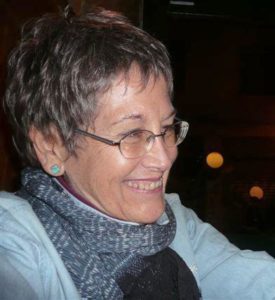
Noni Benegas, born in Buenos Aires and resident in Spain since 1977, is the author of seven books of poetry; a selection is collected in El Ángel de lo súbito, Ed. Fondo de Cultura Económica, (Madrid, 2014). Burning Cartography, Ed. Host, (Austin TX, 2007 and 2011) is a selection of these poems in English, and Animaux Sacrés, Ed. Al Manar (Séte 2013) in French. She has won the Platero Prize from the UN in Geneva; the Miguel Hernández National Prize for Poetry, as well as Vila de Martorell award, the Rubén Darío Prize from Palma in Mallorca, the Esquío Prize in Galicia. She is the author of the influential anthology of contemporary Spanish women poets Ellas tienen la palabra, Ed. Hiperión (Madrid, 2008, 4th edition) whose introductory essay, with a new prologue, articles, interviews and an epilogue has been recently collected by Ed. Fondo de Cultura Economica in 2017 with the same title. Ellas Resisten. Mujeres poetas y artistas (1994-2019) is a selection of her essays on women writers and artists published by Ed. Huerga & Fierro
Editor’s Note: see also Poetry, National Literature Prize 2018, Francisca Aguirre, Translated from Spanish by Amparo Arróspide & Robin Ouzman Hislop
Robin Ouzman Hislop is Editor of Poetry Life and Times ; his publications include
All the Babble of the Souk , Cartoon Molecules and Next Arrivals, collected poems, as well as translation of Guadalupe Grande´s La llave de niebla, as Key of Mist and the recently published Tesserae , a translation of Carmen Crespo´s Teselas.
You may visit Aquillrelle.com/Author Robin Ouzman Hislop about author. See Robin performing his work Performance (University of Leeds)
